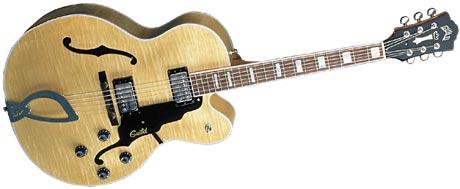|
Lessons
Chord Progressions
Guitar Chords
Guitar Lessons
Songwriting
Standards
Tablature
Links
|
Tritone Substitution
Part XII

Replacing a dominant seventh (or a minor seventh) chord by a dominant seventh chord whose root is a tritone away is referred to as a tritone (or flatted fifth) substitution. A tritone is an interval of an augmented fourth or diminished (flatted) fifth (three whole steps). The box below shows a listing of tritone substitutions.
Original
Chord | Tritone | | A7 | Eb7 |
| Bb7 | E7 |
| B7 | F7 |
| C7 | Gb7 |
| Db7 | G7 |
| D7 | Ab7 |
| Eb7 | A7 |
| E7 | Bb7 |
| F7 | B7 |
| Gb7 | C7 |
| G7 | Db7 |
| Ab7 | D7 |
Another way to look at this type of substitution is that the V can be substituted for the bII7 chord. The first example below shows how a tritone substitution can be used to create a chromatic descending bass line in the jazz progression. The jazz progression bass line movement is changed from cyclical to chromatic. The second example shows how a tritone substitution was used to turn a standard progression into the opening verse progression to Our Day Will Come (Ruby & The Romantics 1963). Then, using an inversion and another tritone substitution, the progression is further transformed into a chromatic descending bass line progression. (Excerpt from Chord Progressions For Songwriters)
(1) Original Progression
| Dm7 / / / | G7 / / / | Cmaj7 / / / | / / / / |
Substitute Progression (Descending Bass Line)
| Dm7 / / / | Db7 / / / | Cmaj7 / / / | / / / / |
(2) Original Progression
| C / / / | Am7 / / / | Dm7 / / / | G7 / / / |
Substitute Progression (Our Day Will Come)
| C / / / | Eb7 / / / | Dm7 / / / | G7 / / / |
Substitute Progression (Descending Bass Line)
| C/E / / / | Eb7 / / / | Dm7 / / / | Db7 / / / |
|
Wikipedia explains it this way:
In jazz music, a tritone substitution is the use in a chord progression of a dominant seventh chord (major/minor seventh chord) that is three steps (a tritone) away from the original dominant seventh chord. For example, Db7 would be the tritone substitution for G7.
The reason these dominant seventh chords may be substituted for each other is they have the same pitches as their third and seventh, albeit reversed. The third of a G7 is B and the seventh is F; the third of a Db7 is F and the seventh is Cb, enharmonically B. Note that the interval between the third and seventh of a dominant seventh chord is itself a tritone.
This substitution is particularly suitable for jazz because it produces chromatic root movement when applied to the ii-V-I progression prevalent in jazz tunes. For example, in the progression Dm7 - G7 - Cmaj7, substituting Db7 for G7 produces the downward movement D - Db - C in the roots of the chords, typically played by the bass. This also reinforces the downward movement of the thirds and sevenths of the chords in the progression (in this case, F/C to F/B to E/B).
Tritone substitutions are also closely related to the alt chord used commonly in jazz. The alt chord is a heavily altered dominant seventh chord, built off of the alt scale that includes a flat ninth, sharp ninth, flat fifth, sharp fifth, and flat seventh. For example, C7alt is built from the scale C, Db, D#, E, Gb, G#, Bb. Enharmonically, this is almost the same as the scale for Gb7, which is the tritone substitute of C7: Gb (=F#), Ab, Bb, Cb, Db, Eb (=D#), Fb (=E). The only difference is C, which is the sharp eleventh of the Gb7 chord. Thus, the alt chord is equivalent to the tritone substitution with a sharp eleven alteration.
Tritone substitutions are a common technique in jazz and were first used by musicians such as Duke Ellington, Art Tatum, Coleman Hawkins, Roy Eldridge and Benny Goodman. Tritone substitutions are a defining part of the Coltrane changes.
Tritone subtitutions are also known as substitute dominants, or Sub-V (Sub-five) chords. (Courtesy of Wikipedia)
Click below for the best in free Tritone (also known as Flat-Five) Substitution lessons and resources available on the web.

About Us |
Chord Progressions |
F.A.Q. |
Freebies |
Guitar Chords |
Guitar Lessons |
Home Page |
Links |
Music News | Site Search |
Songwriting |
Standards |
Store |
Tablature |
WebRings Copyright © 2006 - 2014 MoneyChords.com |